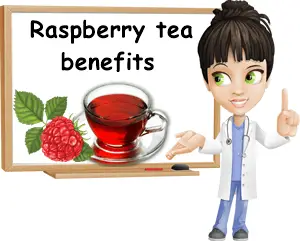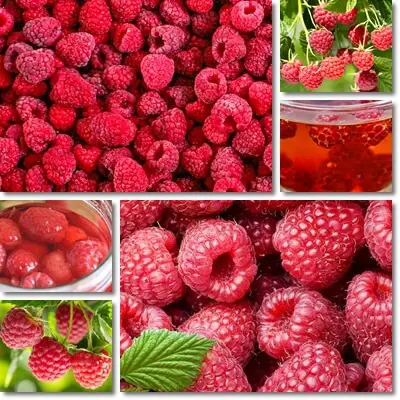Raspberry tea is a herbal infusion made from raspberries. Rich in antioxidant phytochemicals with free radical scavenging, anti-inflammatory and anticancer properties, raspberry tea is particularly healthy. Regular consumption of raspberry tea provides important benefits for health, including benefits for high blood pressure and high cholesterol, cardiometabolic and neuroprotective benefits and benefits for diabetes and weight management. Topical use combats skin fatigue and brightens skin while internal use is a source of antiaging benefits.
What is raspberry tea made from?
Raspberry tea is typically made from pink or red raspberries, but yellow raspberries, purple raspberries and even black raspberries may be used as well. Fresh fruit, dried or frozen fruit or raspberry fruit tea bags may be used to make the tea. However, it’s quite rare to get 100% pure raspberry tea. If you read the label, often times, raspberry tea will contain other ingredients as well, typically red fruits such as strawberries, cranberries, rose hips but also apple, hibiscus flowers, rooibos and spices such as cinnamon. Black tea with raspberry may also be labeled ‘raspberry tea’.

What does raspberry tea look like?
Raspberry tea made exclusively from raspberries has a pink-red color, either lighter or deeper. Exact color depends on the tea concentration (raspberry to water ratio) and how processed the raspberry material are (e.g. fresh, frozen, dried and ground, tea bags).
What does raspberry tea taste like?
Raspberry tea is extremely fragrant, with a strong, fruity, tangy odor. The tea has sharp, fruity flavors and overall tastes fresh and invigorating, and only faintly sweet. Raspberry tea makes the mouth pucker due to tannins and organic acids from the fruit. The tea made from tea bags is more fragrant, with a stronger taste intensity and tangier, whereas the tea made from the fresh berries is mellower and sweeter.
Also see the benefits of raspberry leaf tea.

What are the benefits of red raspberry tea?
Combats skin fatigue
Raspberry tea contains a range of antioxidants, flavonoids, carotenoids, anthocyanins and various polyphenols that actively combat skin fatigue and help brighten skin, giving it a healthy, hydrated and well-rested glow. Tannins and organic acids in the tea exert an astringent action, helping tighten skin for a more youthful appearance.
You can apply the tea bags left over from making raspberry tea on your eyes, undereye area and other parts of the skin to combat skin fatigue and look less tired. Alternatively, you can place the leftover raspberry tea material in a clean cheese cloth and apply on the skin as needed.
Internal and external antiaging action
Raspberries and raspberry seeds, as well as raspberry tea, raspberry seed oil, juice and pomace contain organic chemicals called ellagitannins. When gut bacteria process ellagitannins, a compound called Urolithin A is produced in the body. Studies reveal Urolithin A is a strong anti-aging agent, shown to increase lifespan in C. elegans nematodes by 45% and improve running endurance and capacity for exercise in mice by 42%.
Urolithin A sustains mitochondria recycling by clearing, reprocessing and reusing damaged or faulty mitochondria which are structures in cells responsible for cell functionality. Poor mitochondria recycling is associated with aging. Research shows Urolithin A makes the process of mitochondria recycling more effective which can be translated into anti-aging benefits that manifest both internally and externally in the form of increased lifespan, increased endurance and exercise capacity and potentially also a more youthful appearance due to improved cell functionality.
Animal studies also show that raspberry consumption improves age-related declines in psychomotor function and can help improve or preserve motor function later in life (source) which is further proof of the anti-aging potential of raspberries and raspberry preparations such as tea and juice.
Lowers blood sugar and other benefits for diabetes
Studies show raspberry supplementation significantly lowers blood sugar levels after eating and lowers levels of several inflammation markers in the body (e.g. interleukin, high-sensitivity tumor necrosis factor alpha) in obese adults with type 2 diabetes and overweight and obese adults with pre-diabetes and insulin resistance (source 1, source 2). In addition to benefits for diabetes, raspberry also protects against heart disease associated with the condition by lowering oxidative stress and inflammation conducive to morphological changes in the heart that cause heart disease (source).
The antidiabetic benefits of raspberries are primarily attributed to highly bioactive polyphenols that also get transferred into the tea, making raspberry fruit tea a source of benefits for diabetes as well as the fruits.
Anti-obesity benefits
Consumption of raspberry tea and raspberry fruit left over from the tea can potentially be a source of anti-obesity benefits and possibly also weight loss benefits. Studies show raspberry ketones, major aromatic compounds in raspberry, inhibit lipid accumulation by regulating autophagy in 3T3-L1 cells in obese rats and exert anti-obesity effects (source).
Moreover, polyphenols in raspberry and byproducts such as raspberry tea, extracts and more have been found to produce changes in the gut microbiota of obese diabetic rats which can reduce the severity of the clinical signs associated with obesity (source) and potentially regulate obesity-related signals in liver cells (source).
Good for high cholesterol
Eating fresh raspberries is known to contribute to healthier cholesterol values, a benefit attributed to highly biologically active polyphenols in the fruit, also present in raspberry tea and other byproducts. Animal studies show red raspberry extract improves high blood cholesterol levels and can even protect against high triglyceride levels (source) via bioactive polyphenols.
Cardiovascular protection
Research shows biologically active polyphenols in raspberry tea, extracts and other products ameliorate hyperlipidemia, improve arterial stiffness, lower levels of several inflammation markers in the body such as interleukin-6 (IL-6) and tumor necrosis factor-alpha and contribute to weight control via anti-obesity effects, exerting a synergic action that provides cardioprotective benefits and reduced risks of cardiovascular disease.
Raspberry ketones from the European red raspberry plant might be a valuable entity for the management of myocardial infarction, but the cardioprotective action is dose-dependent (source).
Benefits for high blood pressure
Raspberry tea is a diuretic meaning it helps increase urine output which helps the body get rid of excess water and sodium, contributing to benefits for lowering high blood pressure.
Good for kidney health
Raspberry tea has significant diuretic properties, increasing the discharge of urine and supporting kidney function, with benefits for kidney health.
Neuroprotective effects
Published studies support the anti-glycation and neuroprotective effects of several polyphenol-rich fruits, including red raspberries which are rich in anthocyanins. Anthocyanin-rich extracts from red raspberries (and other colors) showed superior free radical scavenging, reactive carbonyl species trapping, and anti-glycation effects with potential neuroprotective effects against Alzheimer’s Disease (source).
Red raspberry extracts were systematically analyzed to identify bioactive compounds against pathological processes of neurodegenerative diseases and salidroside, a glycosylated phenol, was found to exert significant bioactivity against Huntington’s disease (source).
The neuroprotective effects of raspberry extract can also be found in raspberry tea, albeit in a lesser degree, as bioactive compounds from the fruit are transferred to the tea.
Hepatoprotective benefits
Red raspberry tea is good for liver health because it can reduce levels of reactive oxygen species in liver cells damaged by oxidative stress (source). Animal studies suggest bioactive components in red raspberry can protect against liver injury via a strong antioxidant action, improving pathological conditions of the liver by significantly reducing ALT, AST and LDH activities in serum of liver injury mice, while increasing SOD and CAT activities (source).
Anticancer properties
Raspberry tea is rich in antioxidants such as anthocyanins, carotenoids (xanthophylls such as lutein) and various flavonoids and polyphenols (ellagic acid, ellagitannins, quercetin, kaempferol, catechins, gallic acid, salicylic acid) which scavenge free radicals and help counteract and repair cell damage associated with oxidative stress. Antioxidants lower inflammation markers in the body and protect against chronic disease, including cancer.
According to research, antioxidant polyphenols in red raspberry and byproducts inhibit angiogenesis, that is, the formation of new blood vessels which is what feeds cancer cells and fuels tumor growth, as well as reduce cell viability and cell proliferation in a dose-dependent manner (source).
Fresh red raspberry phytochemicals have also been found to suppress the growth of hepatocellular carcinoma, a type of liver cancer, which is in line with the known hepatoprotective benefits of the fruit and its byproducts (source). Even more, raspberry polyphenols have been found to inhibit the growth of many types of tumors via antioxidant activities. Such phytochemicals are transferred to the tea which confers raspberry tea some degree of anticancer properties as well.
Side effects of raspberry fruit tea
Raspberry tea is generally safe to drink and does not carry any contraindications when consumed as per recommendations. Side effects are possible however, but tend to be very rare and/or minor, usually self-resolving. Side effects of raspberry tea may include:
- Allergic reactions. While rare, it is possible to experience an allergic reaction to raspberry tea made from fresh fruit only, either because of an allergy to raspberries or cross-contamination, or to any kind of raspberry tea. The biggest risk of an allergic reaction is the potential for anaphylactic shock which constitutes a medical emergency.
- Risk of food-borne illness. Raspberries have caused several human norovirus outbreaks in Europe in 2006 and 2009 (source). While rare, there is a risk of contamination with viruses and even bacteria that cause food-borne illness which makes it important to wash the fruit well and use boiling water to make the tea.
